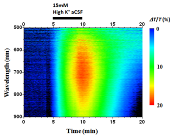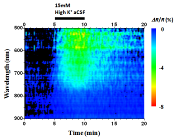

|
Research projects |


|
Optical recording of intrinsic signal originated from neuronal activities in brain tissue |
|
Optical imaging techniques for the brain functions, such as the Diffuse optical topography, the functional optical coherence tomography (fOCT), and the diffuse reflectance imaging, can visualize the spatio-temporal changes of neuronal activities by measuring the changes in optical properties in brain, that is, the intrinsic optical signals (IOSs). It is believed that the IOSs are mainly occurred by (1) changes of optical absorption and scattering originated from blood volume increase, (2) change of optical absorption due to the transition from oxygenated hemoglobin to deoxygenated hemoglobin in red blood cells, and (3) change of optical scattering generated by the cell swelling or shrinkage due to water movement between intracellular and extracellular compartments and concomitant change in the concentration of the cytosol. In vivo optical measurements involve those three types of IOSs multiply. In order to understand the brain functions in more detail by IOSs, it is important to investigate not only the hemodynamics in brain but also the optical properties of brain tissue itself. In vitro brain slice submerged in the artificial cerebrospinal fluid (aCSF) provides the evaluation of the changes in the optical properties of the brain tissue itself without the influences of hemodynamics. We have been investigated the scattering and absorption properties of the rat brain slice under the various physiological conditions on the basis of the spectral measurements of diffuse reflectance and transmittance. |
|
Mailing address:2-24-16, Naka-cho, Koganei, Tokyo 184-8588 JAPAN TEL:+81-42-388-7065 FAX:+81-42-388-7065 E-mail:inishi@cc.tuat.ac.jp |


|
BASE Bio-Applications and Systems Engineering |
|
BMPL Biomedical photonics Laboratory |

|
TUAT Tokyo University of Agriculture and Technology |
|
Collaboration with Prof. M. Sato (Yamagata University) |
|
Copyright © 2007-2013 Medical photonics group at TUAT. All right reserved. Unauthorized use prohibited. |




|
Medical Photonics Group |
|
Biomedical Photonics Laboratory |